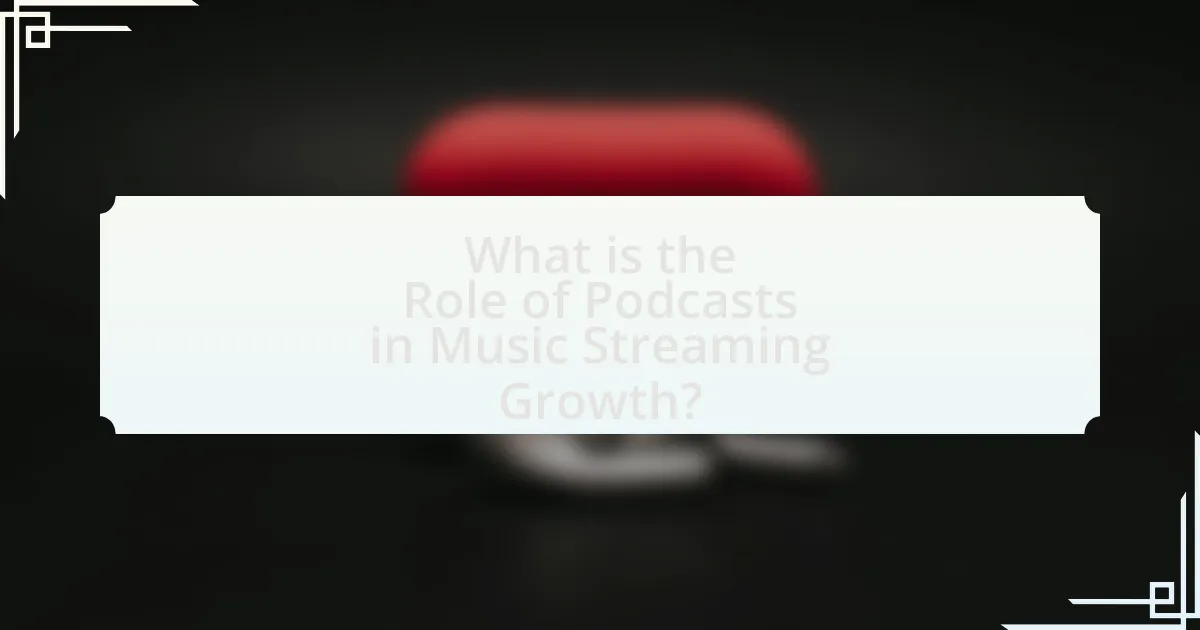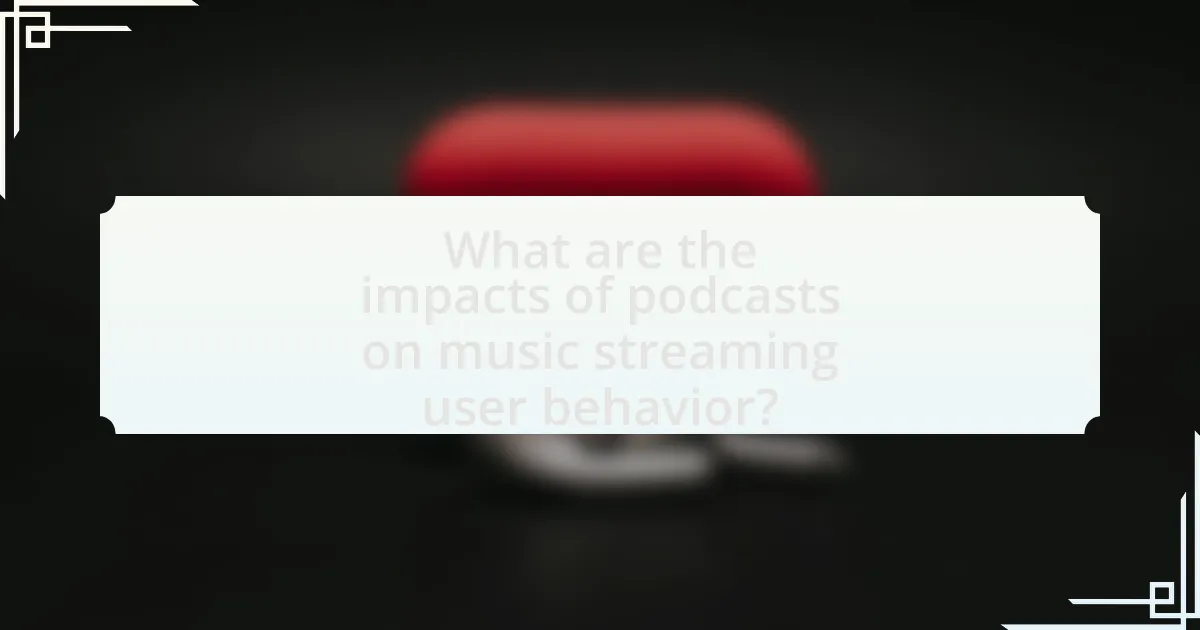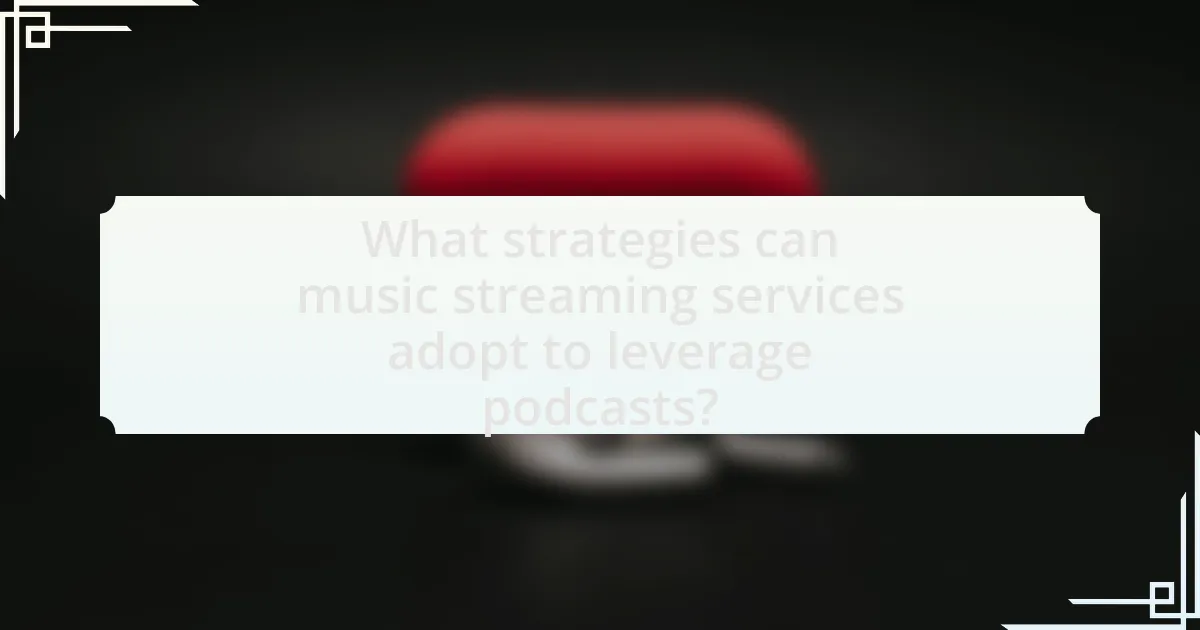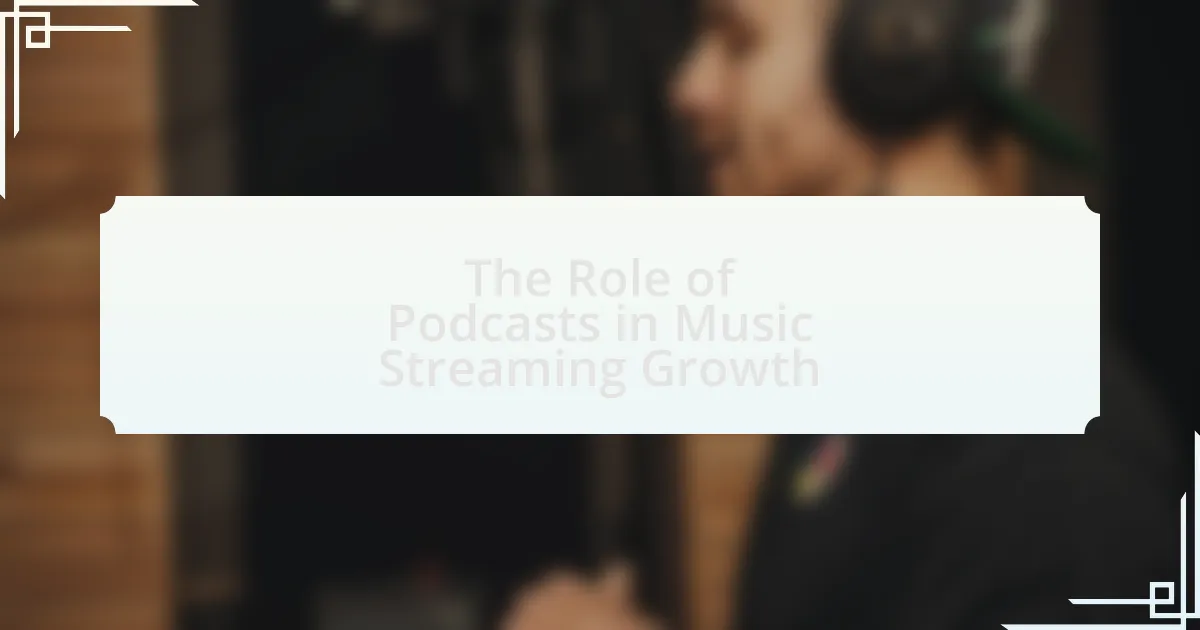Podcasts are increasingly recognized as a crucial component in the growth of music streaming services, enhancing user engagement and attracting new listeners. The integration of podcasts into platforms like Spotify and Apple Music has diversified content offerings, appealing to a wider audience and driving higher retention rates. Research indicates that podcast listeners are more likely to discover new music and spend significantly more time on streaming platforms, highlighting the symbiotic relationship between podcasts and music streaming. Key factors influencing this trend include the potential for advertising revenue, the ability to cater to diverse musical tastes, and the strategic partnerships with artists that enhance visibility and engagement. As the podcasting landscape continues to evolve, music streaming services are expected to leverage this medium to further enrich user experiences and expand their subscriber base.

What is the Role of Podcasts in Music Streaming Growth?
Podcasts play a significant role in the growth of music streaming by enhancing user engagement and attracting new listeners. The integration of podcasts into music streaming platforms, such as Spotify and Apple Music, has expanded their content offerings, making them more appealing to a broader audience. According to a 2021 report by Edison Research, 41% of Americans aged 12 and older have listened to a podcast in the past year, indicating a growing interest in audio content. This increase in podcast consumption drives users to music streaming services, as they seek a one-stop platform for both music and spoken-word content. Additionally, podcasts often feature music, which can lead to increased streams for artists and songs mentioned, further contributing to the overall growth of music streaming.
How have podcasts influenced the music streaming landscape?
Podcasts have significantly influenced the music streaming landscape by driving user engagement and expanding content offerings. Streaming platforms like Spotify and Apple Music have integrated podcasts into their services, attracting a broader audience and increasing user retention. For instance, Spotify reported that podcast consumption on its platform grew by 200% in 2020, indicating a shift in user behavior towards audio content beyond music. This integration allows music streaming services to diversify their content, creating a more comprehensive audio experience that appeals to various listener preferences.
What are the key factors driving the integration of podcasts into music streaming services?
The key factors driving the integration of podcasts into music streaming services include the diversification of content offerings, increased user engagement, and the potential for advertising revenue. Music streaming platforms aim to attract and retain subscribers by providing a broader range of audio content, which podcasts effectively deliver. According to a report by Edison Research, 55% of the U.S. population has listened to a podcast, indicating a growing audience that streaming services can tap into. Additionally, podcasts enhance user engagement by encouraging longer listening sessions, which can lead to higher retention rates. Furthermore, the advertising potential in podcasts is significant; the Interactive Advertising Bureau reported that podcast ad revenue reached $1.4 billion in 2021, showcasing a lucrative opportunity for music streaming services to monetize their platforms through integrated podcast content.
How do podcasts enhance user engagement on music streaming platforms?
Podcasts enhance user engagement on music streaming platforms by providing diverse content that attracts and retains listeners. This additional audio format allows users to explore topics related to music, artists, and industry trends, fostering a deeper connection with the platform. According to a study by Edison Research, 55% of podcast listeners reported discovering new music through podcasts, indicating that this format not only keeps users engaged but also drives music discovery. Furthermore, platforms that integrate podcasts often see increased listening time, as users are more likely to spend extended periods on the app when they have access to both music and engaging spoken content.
Why are podcasts becoming essential for music streaming services?
Podcasts are becoming essential for music streaming services because they enhance user engagement and retention. By offering diverse audio content, streaming platforms can attract a broader audience and keep users on their platforms longer. For instance, Spotify reported that users who engage with podcasts spend 40% more time on the app compared to those who only listen to music. This increased engagement translates to higher subscription rates and advertising revenue, making podcasts a strategic asset for music streaming services.
What unique content do podcasts provide that attracts music listeners?
Podcasts attract music listeners by offering in-depth discussions, artist interviews, and behind-the-scenes insights that traditional music platforms do not provide. This unique content allows listeners to connect with their favorite artists on a personal level, enhancing their overall music experience. For instance, a study by Edison Research found that 55% of podcast listeners are more likely to engage with an artist after hearing them on a podcast, demonstrating the effectiveness of this medium in fostering deeper connections between artists and fans.
How do podcasts help in promoting new music and artists?
Podcasts promote new music and artists by providing a platform for in-depth discussions, interviews, and music showcases that reach targeted audiences. This format allows artists to share their stories, influences, and new releases directly with listeners, fostering a personal connection. According to a 2021 report by Edison Research, 41% of podcast listeners discover new music through podcasts, highlighting their effectiveness in music promotion. Additionally, podcasts often feature curated playlists or music segments, which can lead to increased streaming numbers on platforms like Spotify and Apple Music, further validating their role in the growth of music streaming.

What are the impacts of podcasts on music streaming user behavior?
Podcasts significantly influence music streaming user behavior by increasing user engagement and time spent on platforms. Research indicates that users who listen to podcasts are more likely to explore music content, with a study by Edison Research showing that 54% of podcast listeners also stream music regularly. This cross-engagement leads to higher subscription rates and retention for music streaming services, as platforms like Spotify have reported that podcast listeners tend to spend 30% more time on their apps compared to non-podcast listeners. Additionally, the integration of podcasts into music streaming services encourages users to discover new artists and genres, further enhancing their overall experience and satisfaction with the platform.
How do podcasts affect listener habits on music streaming platforms?
Podcasts significantly influence listener habits on music streaming platforms by increasing user engagement and time spent on these platforms. Research indicates that listeners who engage with podcasts are more likely to explore music content, as they often use the same platforms for both audio formats. For instance, a study by Edison Research found that 54% of podcast listeners also stream music, highlighting a crossover in user behavior. Additionally, platforms like Spotify have reported that the introduction of podcasts has led to longer session times, as users remain on the app to listen to both podcasts and music. This trend demonstrates that podcasts not only attract new users but also enhance the overall listening experience, driving growth in music streaming consumption.
What changes in listening patterns have been observed with podcast integration?
Podcast integration has led to a significant increase in listener engagement and time spent on music streaming platforms. Research indicates that users who engage with podcasts on these platforms tend to listen longer, with average listening times increasing by approximately 30% compared to those who only listen to music. This shift in listening patterns is attributed to the diverse content offered by podcasts, which encourages users to explore beyond their usual music preferences. Additionally, platforms like Spotify have reported that podcast listeners are more likely to discover and engage with new music, further enhancing the overall user experience and driving growth in music streaming.
How do podcasts influence the time spent on music streaming services?
Podcasts increase the time spent on music streaming services by providing users with engaging audio content that complements their listening habits. Research indicates that listeners often turn to music streaming platforms for background music while consuming podcasts, leading to longer overall engagement with these services. A study by Edison Research found that 54% of podcast listeners also use music streaming services, suggesting a strong correlation between podcast consumption and increased music streaming activity. This dual engagement enhances user experience and retention on music platforms, as listeners frequently switch between podcasts and music tracks.
What demographic shifts are occurring due to podcasts in music streaming?
Podcasts are driving significant demographic shifts in music streaming, particularly attracting younger audiences. Research indicates that 54% of podcast listeners are aged 18-34, a demographic that increasingly favors streaming platforms for both music and audio content. This shift is evident as platforms like Spotify and Apple Music integrate podcasts into their offerings, appealing to this younger audience’s preference for diverse audio experiences. Additionally, the rise of podcasting has led to increased engagement among listeners, with 80% of podcast consumers reporting that they listen to all or most of each episode, which enhances their overall streaming habits and loyalty to platforms that provide both music and podcasts.
Which age groups are most engaged with podcasts on music platforms?
The age groups most engaged with podcasts on music platforms are primarily 18 to 34 years old. This demographic represents a significant portion of podcast listeners, with studies indicating that around 50% of individuals in this age range regularly consume podcasts. Additionally, the 35 to 54 age group also shows considerable engagement, accounting for approximately 30% of podcast listeners. These statistics highlight the strong preference for podcasts among younger audiences, particularly those who are tech-savvy and actively seek out audio content for entertainment and information.
How do podcasts cater to diverse musical tastes and preferences?
Podcasts cater to diverse musical tastes and preferences by offering a wide range of genres, formats, and content that appeal to various audiences. They feature specialized shows that focus on specific music styles, such as jazz, hip-hop, classical, or indie, allowing listeners to explore their preferred genres in depth. Additionally, podcasts often include interviews with artists, music critics, and industry professionals, providing insights and recommendations that resonate with different musical interests. According to a 2021 report by Edison Research, 41% of podcast listeners enjoy music-related content, highlighting the significant demand for diverse musical programming. This variety ensures that listeners can find content that aligns with their unique tastes, fostering a more personalized listening experience.

What strategies can music streaming services adopt to leverage podcasts?
Music streaming services can leverage podcasts by integrating them into their platforms to enhance user engagement and retention. By offering exclusive podcast content, streaming services can attract new subscribers and keep existing users engaged, as evidenced by Spotify’s investment in original podcasts, which has contributed to a significant increase in user hours spent on the platform. Additionally, creating personalized podcast recommendations based on listening habits can improve user experience and satisfaction, leading to higher retention rates. Furthermore, partnerships with popular podcast creators can drive traffic and increase brand visibility, as seen with Apple Music’s collaborations that have expanded their audience reach.
How can music streaming platforms effectively promote their podcasts?
Music streaming platforms can effectively promote their podcasts by leveraging personalized recommendations and integrating podcasts into their existing music playlists. Personalized algorithms can analyze user listening habits to suggest relevant podcasts, increasing visibility and engagement. For instance, Spotify reported that users who engage with podcasts spend 30% more time on the platform, demonstrating the effectiveness of this strategy. Additionally, featuring podcasts in curated playlists alongside popular music tracks can attract listeners who may not actively seek out podcasts, thereby broadening the audience. This approach not only enhances user experience but also drives growth in podcast consumption within the streaming ecosystem.
What marketing techniques are successful in attracting podcast listeners?
Successful marketing techniques for attracting podcast listeners include leveraging social media promotion, collaborating with influencers, and utilizing targeted advertising. Social media platforms like Instagram and Twitter allow podcasters to engage with potential listeners through teasers, behind-the-scenes content, and interactive posts, which can significantly increase visibility and interest. Collaborating with influencers who have established audiences can also drive traffic to podcasts, as their endorsements lend credibility and reach. Additionally, targeted advertising on platforms such as Facebook and Google can effectively reach specific demographics, ensuring that promotional efforts are directed toward individuals most likely to be interested in the podcast’s content. According to a 2021 report by Edison Research, 41% of podcast listeners discover new shows through social media, highlighting the effectiveness of these marketing techniques.
How can collaborations with artists enhance podcast visibility?
Collaborations with artists can significantly enhance podcast visibility by leveraging the artists’ established fan bases and social media reach. When a podcast features a well-known artist, it attracts their followers, who may not have been aware of the podcast previously, thereby increasing its audience. For instance, a study by Edison Research found that 44% of podcast listeners are more likely to engage with content that features their favorite musicians. This cross-promotion not only boosts listener numbers but also enhances the podcast’s credibility and appeal, as artists often bring their unique perspectives and creativity to the discussions, making the content more engaging.
What best practices should be followed for podcast production in music streaming?
Best practices for podcast production in music streaming include ensuring high audio quality, creating engaging content, and maintaining a consistent release schedule. High audio quality is crucial as it enhances listener experience; studies show that 70% of listeners abandon podcasts with poor sound. Engaging content, tailored to the target audience, keeps listeners interested and encourages sharing, which can increase reach. A consistent release schedule builds audience anticipation and loyalty, with research indicating that regularity can boost listener retention by up to 50%.
What are the key elements of a successful music-related podcast?
The key elements of a successful music-related podcast include engaging content, knowledgeable hosts, high production quality, and effective marketing strategies. Engaging content captivates listeners by featuring interviews with artists, discussions on music trends, and deep dives into specific genres or albums. Knowledgeable hosts enhance credibility and provide insightful commentary, which keeps the audience informed and entertained. High production quality, including clear audio and professional editing, ensures a pleasant listening experience, which is crucial for retaining listeners. Effective marketing strategies, such as leveraging social media and collaborating with other creators, help to reach a wider audience and promote the podcast effectively. These elements collectively contribute to the podcast’s success in the competitive music streaming landscape.
How can music streaming services ensure high-quality podcast content?
Music streaming services can ensure high-quality podcast content by implementing rigorous content curation and quality control processes. These services can establish partnerships with reputable podcast creators and production companies, ensuring that only well-produced and engaging content is featured. For instance, Spotify has invested in exclusive podcast deals with established creators, which enhances the overall quality of their offerings. Additionally, utilizing listener feedback and analytics can help identify popular themes and formats, allowing services to refine their content strategy. Research indicates that platforms that prioritize high-quality content see increased user engagement and retention, which is crucial for growth in the competitive streaming market.
What future trends can we expect in the relationship between podcasts and music streaming?
The relationship between podcasts and music streaming is expected to evolve towards greater integration and cross-promotion. As music streaming platforms increasingly recognize the value of podcasts in attracting and retaining subscribers, they are likely to invest in exclusive podcast content and collaborations with popular creators. For instance, Spotify has already made significant moves by acquiring podcast networks and producing original shows, which has led to a reported increase in user engagement and subscription growth. Additionally, data from Edison Research indicates that podcast consumption is on the rise, with 41% of Americans aged 12 and older having listened to a podcast in the past year, suggesting a growing audience that music streaming services can tap into. This trend indicates that the synergy between podcasts and music streaming will continue to strengthen, enhancing user experience and expanding content offerings.
How might advancements in technology shape the podcasting landscape in music streaming?
Advancements in technology will significantly shape the podcasting landscape in music streaming by enhancing content delivery, personalization, and interactivity. For instance, improvements in artificial intelligence and machine learning enable platforms to analyze user preferences and recommend tailored podcast content, thereby increasing listener engagement. Additionally, the integration of voice recognition technology allows users to interact with podcasts through smart speakers, making access more convenient and fostering a hands-free listening experience. According to a report by Edison Research, 55% of the U.S. population has listened to a podcast, indicating a growing trend that technology advancements can further amplify by making podcasts more accessible and integrated within music streaming services.
What potential challenges could arise as podcasts continue to grow in music streaming?
As podcasts continue to grow in music streaming, potential challenges include increased competition for listener attention and content saturation. The rise of podcasts can divert users from music, leading to a decline in music streaming engagement. According to a report by Edison Research, 55% of Americans have listened to a podcast, indicating a significant audience shift that could impact music consumption. Additionally, the influx of podcast content may overwhelm users, making it difficult for them to discover quality music, as platforms may struggle to balance podcast and music recommendations effectively. This challenge is compounded by the need for streaming services to invest in both podcast production and music licensing, which can strain resources and affect overall service quality.

Leave a Reply